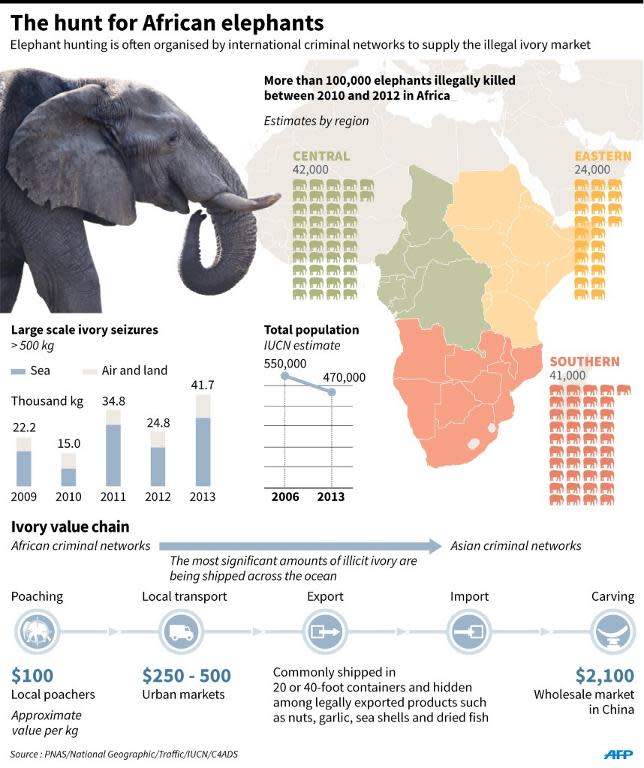Tanzania elephants suffer 'catastrophic decline'
Elephant census figures released by Tanzania show a "catastrophic decline" of around 60 percent over the last five years, leading wildlife trade monitoring group TRAFFIC said Tuesday. "The government's figures show Tanzania lost tens of thousands of elephants over the past decade," said Steven Broad, TRAFFIC's executive director. "It is incredible that poaching on such an industrial scale has not been identified and addressed before now." Census figures released by Tanzania's government on Monday showed a decline from 109,051 in 2009 to 43,330 in 2014, according to the group. TRAFFIC said the numbers reflected an "elephant disaster" in Tanzania, and a "catastrophic decline" in a country that has in recent years become a leading source of illegal ivory. Tanzania's minister for natural resources and tourism, Lazaro Nyalandu, said the results of the census were a "mixed bag". He drew attention to the Serengeti where numbers had nearly doubled to 6,087 as well as smaller, less well-known reserves such as Rubondo Island National Park where elephant numbers increased by 108 percent, from 49 elephants in 2009 to 102 in 2014. - 'Haemorrhaging ivory' - Nyalandu said the decline from 20,000 to 8,272 in just one year in Ruaha-Rungwa was "troubling news" and that his ministry was "actively engaged" in finding out what happened. "Were they killed or did they move out of the area?" he asked. TRAFFIC said the figures confirm its research that shows "a profound shift in ivory smuggling routes to Tanzania's Indian Ocean ports of Dar es Salaam and Zanzibar as the principle exit points for vast quantities of ivory" with at least 45 tonnes being shipped out of Tanzania since 2009. A report by the London-based Environmental Investigation Agency in November said that criminal gangs and smuggling syndicates had turned Tanzania into "the biggest source of illegal ivory seized around the world". Demand for ivory in China is driving a new surge in elephant poaching with more than 30,000 African elephants killed every year. Nyalandu said Tanzania had come up with new measures to "address the scourge of poaching" including the hiring of 500 more wildlife rangers. "Fighting poaching is a decades long struggle," he said. TRAFFIC welcomed the announcement but warned "it could be a case of too little too late for some elephant populations". "Tanzania has been haemorrhaging ivory with Ruaha-Rungwa the apparent epicentre and nobody seems to have raised the alarm," said Broad. "It is clearly essential that the government establish exactly how this has been allowed to take place, while taking urgent and incisive action to bring the situation under control."



